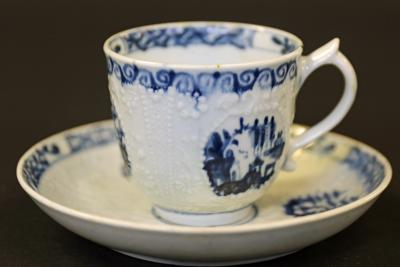EXTENSIVE COLLECTION OF LOWESTOFT PORCELAIN TO GO UNDER THE HAMMER

One of the largest private collections of Lowestoft porcelain ever to come onto the market is to go under the hammer in Norfolk in March.
The collection, comprising several hundred pieces of blue and white and polychrome wares spanning the output of the factory across its 40 year existence and which includes some rare pieces, is to be sold by Keys Fine Art Auctioneers in Aylsham, Norfolk.
The collection will be sold across two separate sales, with the blue and white pieces forming part of Keys three day Fine Sale from 21st to 23rd March, and the polychrome wares going under the hammer in July.
Included in the March sale are:
- An extremely rare Lowestoft spoon from around 1770; it is believed that such a spoon has never come up for auction before, and the piece has a pre-sale estimate of £1,500-£2,000
- A Lowestoft feeding cup from 1768. These were used by wet nurses in the 18th century, and Lowestoft was the only factory to produce them in any quantity. Estimate £1,000-£1,500
- A rare recumbent ram figure from around 1780. Although much of its output was functional, the Lowestoft factory made a very small number of porcelain figures. Estimate £1,200-£1,800
- Several early examples of pieces with ‘Hughes moulding’, named for the mould-maker James Hughes. One example is a cup and saucer with crisp moulding indicating it was from the very early days of the factory, estimate £300-£400
“This sale is an excellent opportunity for porcelain collectors across East Anglia and beyond to acquire rare examples of the region’s ceramic heritage, with a number of early and rare pieces being offered for sale,” said David Broom, ceramics specialist at Keys.
“This is a unique collection, one of the biggest ever to come to auction, and because it spans the whole 43 year history of the Lowestoft factory, it encompasses an amazing variety of shapes and objects produced during those years.”
The Lowestoft factory produced soft-paste porcelain ware from 1756 until its closure in 1799 – the longest duration of any English soft-paste porcelain producer other than Worcester and Crown Derby. Built on the site of an existing pottery or brick kiln, the building was later used as a brewery and malt kiln, before being finally demolished in 1955.
Keys has a growing reputation in ceramics, with several important pieces sold during 2016. According to David Broom, changes in the market have led to a new appetite for quality ceramic sales.
“The demise of specialist antiques shops and the growth of online sales has meant that collectors have less opportunity to handle and study pieces to build their knowledge,” he said.
“Our increasing specialism in ceramics, and a series of important sales, is giving collectors the chance to do just that, whether they are visiting our Norfolk salerooms to handle the pieces in person, or bidding online.”
The first part of the Lowestoft porcelain collection will go under the hammer on the first day of Keys three day Fine Sale on Tuesday 21st March. Full details of the items on sale, and details of viewing, are available at www.keysauctions.co.uk.













































